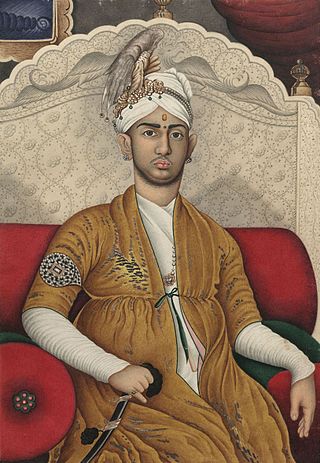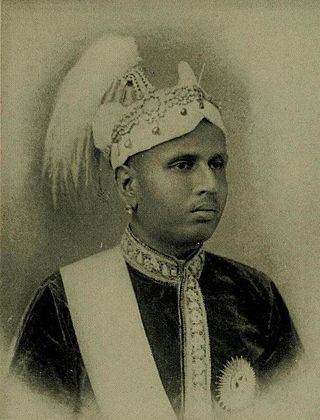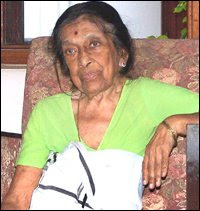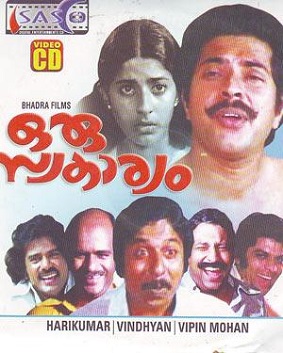
Sri Swathi Thirunal Rama Varma III was the Maharaja of the Kingdom of Travancore. He was a great musician and composer who has to his credit over 400 classical compositions in both Carnatic and Hindustani style.

Raja Ravi Varma was an Indian painter and artist. His works are one of the best examples of the fusion of European academic art with a purely Indian sensibility and iconography. Especially, he was notable for making affordable lithographs of his paintings available to the public, which greatly enhanced his reach and influence as a painter and public figure. His lithographs increased the involvement of common people with fine arts and defined artistic tastes among the common people. Furthermore, his religious depictions of Hindu deities and works from Indian epic poetry and Puranas have received profound acclaim. He was part of the royal family of erstwhile Parappanad, Malappuram district.

Sir Sri Moolam Thirunal Rama Varma VI (1857–1924) was Maharajah of the princely state of Travancore between 1885 and 1924, succeeding his uncle Maharajah Visakham Thirunal (1880–1885). Moolam Thirunal is considered as the first in India to implement the concept of public participation in governance through the formation of Travancore Legislative Council.

Maharani Ayilyom Thirunal Gowri Lakshmi Bayi (1791–1815), also spelled Gauri Lakshmi Bayi, was the Maharani of the Indian state of Travancore from 1810 till 1813 and Regent from 1813 till her death in 1815 for her son Swathi Thirunal Rama Varma. She was the only Queen of Travancore to have reigned in her own right which she did for three years before becoming the regent for her son.

Maharani Uthrittathi Thirunal Gowri Parvathi Bayi (1802–1853) was the Regent of the Indian state of Travancore in 1815–1829. She succeeded her sister Maharani Gowri Lakshmi Bayi, till her regency was relinquished in favour of her nephew, Maharajah Swathi Thirunal.

Sri Padmanabha DasaSir Sri Visakham Thirunal Rama Varma VFRAS, also known as Rama Varma the Learned, was the Maharaja of Travancore from 1880 to 1885 AD, succeeding his elder brother Ayilyam Thirunal on the musnud, or throne. He was a noted scholar of Sanskrit and literary composer in Malayalam, who reversed his brother's policy, liberally patronizing poet Kerala Varma, while hostile to painter Raja Ravi Varma.

The Travancore royal family was the ruling house of the Kingdom of Travancore. The Travancore royal family signed a treaty with the British in 1788, thereby adopting British dominance. Later, in 1805, they revised the treaty, leading to a diminution of royal authority and the loss of political independence for Travancore. They had to give up their ruling rights over the common people in 1949 when Travancore were forced to merge with Independent India and their political pension privileges were abolished in 1971.

Dillivala Rajakumaran is a 1996 Malayalam film by Rajasenan starring Jayaram, Manju Warrier, Biju Menon, and Kalabhavan Mani. The movie tells a fictional story inspired by the Travancore Royal Family's famous Padiyettam ceremony which last happened in the year 1994 when Aswathi Thirunal Gowri Lakshmi Bayi of the Travancore Royal Family adopted Bharani Thirunal Lekha Parvathi Bayi.

Vachanam is a 1990 Malayalam-language mystery film directed by Lenin Rajendran. The film stars Jayaram, Suresh Gopi, Sithara and Charuhasan. The film has a musical score composed by Mohan Sithara. The art direction is done by P. Krishnamoorthy.
Kanjirottu Yakshi is a folkloric deity of South India. According to the myth, she was born into a Padamangalam family by name Mangalathu at Kanjiracode in Southern Travancore. Also known as Chiruthevi, she was a beautiful courtesan who had an intimate relationship with Raman Thampi, son of King Rama Varma and rival of Anizhom Thirunal Marthanda Varma. She turned into a Yakshi after being murdered by her palanquin-bearer, waylaying men with her beauty and drinking their blood.
Thirunal is a surname. Notable people with the surname include:

Raja Raja Varma Koil Thampuran, also known as Raja Raja Varma, was a Malayalam language poet and translator from the Indian state of Kerala who had an equal facility in writing in English and Sanskrit. He was born in Neerazhi Palace, Changanassery. He was part of the royal family of erstwhile Parappanad, Malabar.

Sree Padmanabhadasa Sree Moolam Thirunal Rama Varma is the current incumbent to the throne of Travancore. He is the youngest of the four children of the former titular Maharani of Travancore, Sree Padmanabhasevini Maharani Karthika Thirunal Lakshmi Bayi and her husband, Prince Consort Lt. Col. G. V. Raja of Poonjar Royal House.

Maharani Karthika Thirunal Lakshmi Bayi (1916-2008) was the only sister of the last ruling Maharajah of Travancore, Sree Chithira Thirunal Balarama Varma and of his successor, Sree Uthradom Thirunal Marthanda Varma. Under the matrilineal Marumakkathayam system of inheritance prevalent in the kingdom of Travancore, it was her children who were heirs to the throne. She therefore held a very special place in the Travancore court, superior to the Maharaja's wives, and was termed the Rani of Attingal in her own right. In 2013, her only surviving son duly succeeded his uncles as titular Maharaja of Travancore and is known as Moolam Thirunal Rama Varma.

Moolam Thirunal Sethu Parvathi Bayi (1896–1983), better known as Amma Maharani, was the Junior Maharani (Queen) of Travancore as well as a promoter of Indian Classical music. She was the mother of Chithira Thirunal Balarama Varma, the last King of Travancore. She was the president of the National Council of Women in India in 1938–1944.

Aswathy Thirunal Gowri Lakshmi Bayi is an Indian writer from Kerala and a member of the Travancore Royal Family. She has ten books to her credit. Aswathy Thirunal is the niece of the last King of Travancore, Chithira Thirunal Balarama Varma. She was awarded India's fourth highest civilian award the Padma Shri in 2024.

Oru Swakaryam is a 1983 Indian Malayalam-language film, directed by Harikumar and produced by Vindhyan. The film stars Venu Nagavally, Jalaja, Mammootty and Jagathy Sreekumar. The film has musical score by M. B. Sreenivasan.

Ayilyam Thirunal Gowri Rukmini Bayi was the Junior Maharani of Travancore styled Attingal Elaya Thampuran.
Diwan BahadurPalakkal Raman MenonDalawaMannadinayar was Dewan of Travancore, serving Maharani Gowri Lakshmi Bayi, and then Maharani Gowri Parvati Bayi during their successive regencies for Maharaja Swathi Thirunal Rama Varma, from 1815 to 1817, and Dalawa of Travancore thereafter, holding auxiliary office as Fouzdar.
















